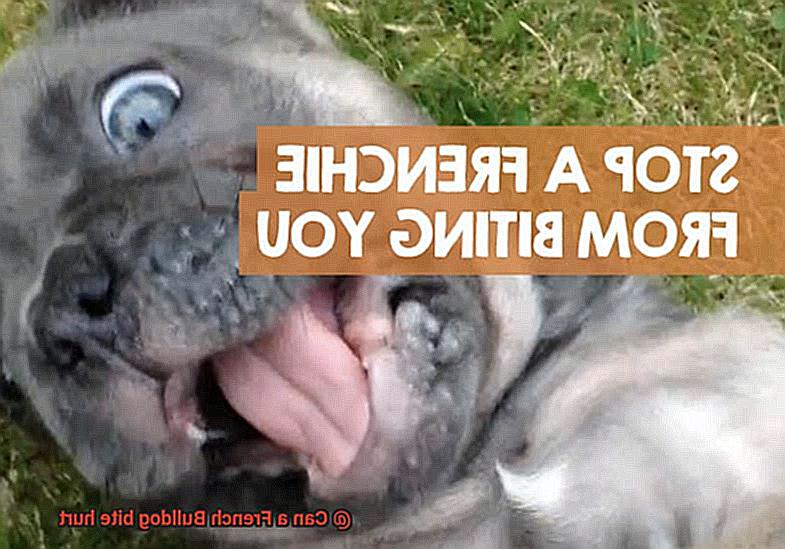Can a French Bulldog bite hurt?
Today, we’re sinking our teeth into a topic that’s got everyone barking: French Bulldog bites. These pint-sized pooches have stolen hearts worldwide with their adorable antics and squishy faces. But let’s get real for a moment – have you ever wondered if their bite is more than just a gentle nibble?
Sure, French Bulldogs are generally known for being friendly and affectionate, but it’s important to remember that any dog, regardless of breed, can bite if they feel threatened or anxious. In this blog post, we’ll dig deep into the risks associated with French Bulldog bites and find out if it’s just a harmless pinch or something more serious.
So gather ’round as we separate fact from fiction and explore the factors that influence a French Bulldog’s biting tendencies. We’ll also uncover the severity of their attacks and share some tips on preventing such incidents. Get ready to unleash your curiosity and become an expert in dog behavior and responsible pet ownership.
But before we dive in, let’s debunk some myths surrounding these captivating canines. Don’t be fooled by their small size – a French Bulldog’s bite should not be underestimated. Stick with us to discover the real potential dangers that can arise from a nip by one of these furry friends.
So buckle up and join us on this informative journey as we answer the burning question: Can a French Bulldog bite hurt? Trust us, it’s going to be one paw-some read.
The Strength of a French Bulldog’s Bite
Contents
- 1 The Strength of a French Bulldog’s Bite
- 2 Factors That Affect the Severity of a French Bulldog Bite
- 3 How to Prevent Bites from Occurring
- 4 What to Do If Your French Bulldog Bites You
- 5 Understanding Canine Body Language and Signs of Aggression
- 6 The Importance of Socialization and Training for French Bulldogs
- 7 Impact of Genetics on a French Bulldog’s Bite Force
- 8 Common Misconceptions About French Bulldogs and Biting Behavior
- 9 Conclusion
French Bulldogs are beloved for their charming personalities and adorable appearance. However, it’s important for owners to understand that even these small dogs have a bite force that can cause discomfort and injury. In this article, we’ll explore the strength of a French Bulldog’s bite, how it can vary from dog to dog, and what owners can do to prevent biting incidents.
Understanding the Bite Force:
Despite their compact size, French Bulldogs possess a surprisingly strong bite force. On average, their bite force ranges around 305 pounds per square inch (psi). While this may not be as powerful as larger breeds like German Shepherds or Rottweilers, it is still capable of breaking the skin, causing bruising or puncture wounds.
Factors Affecting Bite Strength:
The severity of a French Bulldog’s bite can vary from dog to dog. Several factors influence their bite strength:
- Genetics: The genetic makeup of a French Bulldog plays a significant role in determining its bite strength. Dogs from bloodlines with a history of strong bites will generally have a more powerful jaw.
- Health: A dog’s overall health can affect its bite strength. Oral health issues such as dental diseases or misaligned teeth may impact the effectiveness of their bite.
- Temperament: Individual temperament also plays a role in bite strength. Well-socialized and trained French Bulldogs are less likely to exhibit aggressive biting behavior.
Preventing Biting Incidents:
To minimize the risk of biting incidents, it is crucial for owners to take proactive steps:
- Early Socialization: Exposing your French Bulldog to various people, animals, and situations from a young age helps them develop positive behaviors and reduces the likelihood of aggression.
- Obedience Training: Teaching your Frenchie basic commands like “sit,” “stay,” and “leave it” helps establish boundaries and reinforces proper behavior.
- Supervision: Never leave your French Bulldog unsupervised, especially around small children or unfamiliar individuals. This ensures any potential signs of aggression or discomfort can be addressed promptly.
- Mental and Physical Stimulation: Providing your dog with regular exercise, interactive toys, and positive reinforcement training helps keep them mentally and physically stimulated, reducing the chances of destructive behavior or aggression.
- Recognize Warning Signs: Learn to recognize signs of stress or discomfort in your French Bulldog, such as growling, snapping, or freezing. If you notice these behaviors, seek guidance from a professional dog trainer or behaviorist to address the underlying issues.
Factors That Affect the Severity of a French Bulldog Bite

French Bulldogs may be small in size, but don’t underestimate the power of their bite. Understanding the factors that can affect the severity of a French Bulldog bite is crucial for responsible ownership and preventing potential injuries. Let’s dive into these factors and learn how to keep everyone safe.
- Size and Strength: Contrary to their petite appearance, French Bulldogs have surprisingly strong jaws. The size and strength of a dog can greatly influence the severity of its bite. Larger and more muscular French Bulldogs tend to have more powerful bites, capable of causing deep wounds. However, even smaller French Bulldogs can deliver painful bites if they exert enough force.
- Aggression Levels: The level of aggression displayed by a French Bulldog can also impact the severity of its bite. Dogs that are more aggressive may bite more forcefully and hold on, resulting in deeper puncture wounds. On the other hand, well-trained and socialized French Bulldogs are less likely to exhibit aggressive behaviors, reducing the risk of severe bites.
- Bite Inhibition: Bite inhibition refers to a dog’s ability to control the force of its bite. Some French Bulldogs may have better bite inhibition than others due to genetics or proper training. Dogs with good bite inhibition are less likely to cause serious injuries even if they do bite.
- Provocation or Fear: The circumstances surrounding a French Bulldog’s bite can also affect its severity. If a dog feels threatened or provoked, it may respond with a more intense bite as a means of self-defense. Similarly, fear can trigger aggressive behavior in dogs, leading to potentially more harmful bites.
- Prey Drive: French Bulldogs have a natural prey drive, which is their instinct to chase and capture small animals or objects. This prey drive can influence the intensity of their bites, especially if they perceive something as prey-like or threatening.
- Socialization and Training: Proper socialization and training play a crucial role in preventing severe bites from French Bulldogs. Well-socialized dogs are more comfortable around people and other animals, reducing the likelihood of defensive or aggressive behavior. Training can also teach French Bulldogs to control their impulses and respond appropriately in different situations.
- Health Conditions: Certain health conditions can impact a French Bulldog’s bite strength and severity. For example, dental problems such as misaligned or damaged teeth can make their bites more painful. Additionally, pain or discomfort from other medical issues may cause a dog to react aggressively or defensively, resulting in more severe bites.
By being aware of these factors, French Bulldog owners can take proactive measures to minimize the risk of their dogs inflicting severe bites. Responsible ownership, including training, socialization, and regular veterinary care, can greatly reduce the likelihood of aggressive behaviors and serious injuries caused by bites.
How to Prevent Bites from Occurring
French Bulldogs are known for their friendly nature, but like any dog, they can still bite if provoked or feel threatened. To ensure the safety and well-being of both humans and dogs, it is essential to take proactive steps to prevent bites from occurring.
Socialization and Training:
Proper socialization and training are key in preventing bites. Expose your French Bulldog to different people, animals, and environments from a young age to help them become well-adjusted and less likely to bite out of fear or anxiety. Obedience training establishes boundaries and teaches them how to respond to commands promptly.
Understanding Canine Body Language:
Learn to recognize signs of stress or discomfort in your French Bulldog. Common signs include growling, barking excessively, showing teeth, stiff body posture, raised fur, or avoidance behavior. If you notice these signs, give your dog space and address the underlying cause of their discomfort.
Proper Supervision:
Always supervise interactions between your French Bulldog and unfamiliar people or animals. Pay close attention when young children are around as they may not know how to approach or handle dogs appropriately. Never leave a young child alone with any dog breed.
Providing a Stimulating Environment:
Boredom and frustration can lead to biting behavior. Ensure your French Bulldog has enough mental and physical stimulation through daily walks, interactive toys, and playtime. A tired and content dog is less likely to engage in aggressive behavior.
Regular Veterinary Check-Ups:
Maintaining your French Bulldog’s health is crucial in preventing bites. Schedule regular veterinary check-ups to ensure they are in good physical condition. Medical issues can contribute to aggression or discomfort.
What to Do If Your French Bulldog Bites You
French Bulldogs are known for their friendly and affectionate nature, but even the sweetest dogs may bite if they feel threatened or scared. While prevention is key, accidents can happen. In this article, we will guide you through what to do if your French Bulldog bites you, emphasizing the importance of remaining calm and taking appropriate steps to ensure your safety and well-being.
Stay Calm and Assess the Bite:
If your French Bulldog bites you, it’s crucial to stay calm and avoid panicking. Your reaction can influence the dog’s behavior. Assess the severity of the bite – if it’s minor with no broken skin or excessive bleeding, you can handle it yourself. However, seek medical attention immediately for deep bites or significant bleeding.
Clean the Wound Thoroughly:
Regardless of the severity, clean the wound promptly with mild soap and warm water. Gently wash the area to remove any debris or bacteria. Apply an antiseptic solution to prevent infection, and cover the wound with a sterile bandage or dressing.
Monitor for Infection:
Keep a close eye on the wound for any signs of infection, such as redness, swelling, or discharge. If these symptoms occur, seek medical attention promptly. Infections can worsen if left untreated and may require antibiotics.
Understand Why Your French Bulldog Bit You:
To prevent future biting incidents, it’s crucial to understand why your French Bulldog bit you. It could be due to fear, pain, possessiveness, or other underlying issues. Consulting with a professional dog trainer or behaviorist can help address the root cause of aggression and provide effective strategies for behavior modification.
Avoid Punishment and Focus on Positive Reinforcement:
Punishing your French Bulldog or using physical reprimands can worsen the situation and damage the trust between you and your dog. Instead, focus on positive reinforcement training techniques. Reward good behavior and redirect or ignore unwanted behavior.
Socialize Your French Bulldog:
Socializing your French Bulldog from an early age is crucial to minimize the likelihood of biting incidents. Expose them to various environments, people, and other animals in a controlled and positive manner. This helps them become more comfortable and confident in different situations.
Regular Veterinary Check-ups:
Ensure your French Bulldog receives regular veterinary check-ups to address any underlying health issues that may contribute to aggressive behavior. Undiagnosed medical conditions or pain can make a dog more prone to biting.
Understanding Canine Body Language and Signs of Aggression
As a French Bulldog owner, it is crucial to understand your furry friend’s body language and recognize signs of aggression. By doing so, you can ensure a safe and harmonious environment for both your dog and those around them. In this blog post, we will explore the importance of understanding canine body language and provide insights specifically tailored to French Bulldogs.
Why is Understanding Canine Body Language Important?
Canine body language is like a secret code that dogs use to communicate their emotions and intentions. By deciphering this code, we can better understand how our dogs are feeling and respond accordingly. This is particularly important when it comes to aggression.
Signs of Aggression in French Bulldogs

French Bulldogs, like any other breed, can display signs of aggression when they feel threatened or uncomfortable. It is crucial to be able to recognize these signs to prevent potentially harmful situations. Here are some common signs of aggression in French Bulldogs:
- Growling: This low, rumbling sound is a clear indication that your dog is feeling aggressive and may escalate the situation if not addressed.
- Snarling and Baring Teeth: When a French Bulldog snarls and shows their teeth, it is a warning sign that they are ready to defend themselves.
- Stiffening of the Body: A tense and rigid posture indicates that your dog is on high alert and may become aggressive if provoked further.
- Raised Fur along the Back: Known as “hackles,” raised fur along the back signifies that your French Bulldog is feeling threatened or aggressive.
- Direct Eye Contact: Intense eye contact can be a sign of dominance or aggression in dogs. If your French Bulldog engages in prolonged and direct eye contact, it’s best to diffuse the situation.
Understanding Subtle Warning Signs
Not all signs of aggression are obvious. In fact, dogs often display subtle warning signs before resorting to more aggressive behaviors. These signs include:
- Lip Licking: If your French Bulldog licks their lips excessively, it may be a sign of stress or discomfort.
- Yawning: Dogs sometimes yawn when they are feeling anxious or overwhelmed.
- Whale Eye: When the whites of your dog’s eyes are visible, it indicates that they are feeling fearful or threatened.
- Freezing in Place: When a dog freezes and becomes immobile, it is a sign that they are unsure or uncomfortable with the current situation.
Taking Action and Seeking Professional Help
Understanding your French Bulldog’s body language is just the first step in addressing aggression issues. It is essential to take proactive steps to prevent harm and ensure your dog’s well-being. Here are some actions you can take:
Modify Your Approach: If you notice signs of discomfort in your French Bulldog’s body language, modify your approach and create a more relaxed environment for them.
The Importance of Socialization and Training for French Bulldogs
French Bulldogs, with their adorable looks and affectionate nature, have become increasingly popular as family pets. However, to ensure they become well-rounded, confident, and well-behaved companions, it is crucial to prioritize their socialization and training. In this blog post, we will explore why these aspects are essential for French Bulldogs and how they can positively impact their lives.
The Power of Socialization
French Bulldogs, like all dogs, thrive when they are socialized from an early age. Socialization helps them develop appropriate behavior and reduces the risk of fear-based or aggressive behaviors. By exposing your French Bulldog to various environments, sounds, smells, and situations, you are ensuring they grow up to be adaptable and confident dogs.
- Positive Experiences: Introduce your French Bulldog to different people, children, animals, and environments like parks or pet-friendly stores. By creating positive experiences in these settings, you are fostering their ability to interact with others in a friendly manner.
- Building Confidence: Regular socialization helps build your French Bulldog’s confidence. It teaches them how to navigate new situations without feeling anxious or fearful.
- Preventing Aggression: Proper socialization significantly reduces the risk of aggression in French Bulldogs. By exposing them to different dogs and people, you are teaching them appropriate ways to interact and preventing potential conflicts.
The Power of Training
Training is equally important for French Bulldogs as it helps establish boundaries, promotes good behavior, and strengthens the bond between you and your furry friend.

- Basic Obedience Training: Start with simple commands like sit, stay, come, and walking on a leash. These commands create a foundation for further training and ensure your French Bulldog understands their place in the pack.
- Positive Reinforcement: Utilize positive reinforcement techniques such as treats, praise, and play during training sessions. This motivates and rewards your French Bulldog, making the learning process enjoyable for them.
- Consistency is Key: Consistency is crucial when training a French Bulldog. Keep training sessions short but frequent to maintain focus and prevent overwhelm. Remember, Rome wasn’t built in a day.
- Addressing Behavioral Issues: Training can help address behavioral issues that may arise in French Bulldogs, such as excessive barking or separation anxiety. By consistently reinforcing desired behaviors, you are setting your French Bulldog up for success.
The Perfect Duo: Socialization and Training
Socialization and training go hand in hand when it comes to raising a well-rounded French Bulldog. A well-socialized dog who has undergone proper training is more likely to be well-behaved, friendly, and less prone to aggressive behaviors or biting incidents.
Impact of Genetics on a French Bulldog’s Bite Force
When it comes to French Bulldogs, their bite force is not to be underestimated. But did you know that genetics and breeding practices play a significant role in determining the strength of their bite? In this blog post, we will explore the impact of genetics on a French Bulldog’s bite force and how breeding practices can influence this crucial characteristic.
The Genetic Factors:
A French Bulldog’s bite force is influenced by various genetic factors. One crucial aspect is their unique jaw structure. The shape of their skull, size of the jaw muscles, and alignment of the teeth all contribute to their biting power. These factors are determined by their genetic makeup, which can vary from dog to dog.
Genetic Variations:
Just like humans, French Bulldogs can have different genetic variations that affect their bite force. Certain variations can result in a stronger bite force, while others may lead to a weaker bite force. This is why it is essential for breeders to carefully select and pair dogs with desirable genetic traits to ensure the overall health and well-being of the breed.
Breeding Practices:
Breeders play a vital role in shaping a French Bulldog’s bite force through their breeding practices. Responsible breeders prioritize breeding for strong jaws and proper alignment of teeth. By selecting dogs with desirable genetic traits that contribute to a powerful bite, they help produce French Bulldogs with a strong biting force.
On the other hand, breeders who do not prioritize these traits may unknowingly produce French Bulldogs with weaker bite forces. This emphasizes the importance of choosing reputable breeders who prioritize the health and physical characteristics of the breed.
Understanding the impact of genetics on a French Bulldog’s bite force is crucial for both breeders and owners. By considering the genetic factors that contribute to a powerful biting force, breeders can ensure the overall health of the breed.
Owners, in turn, can be aware of potential variations in bite force and take appropriate measures to prevent any harm.
Remember, a French Bulldog’s bite force is not just a matter of strength; it is a reflection of their genetic makeup. So, whether you’re a breeder or an owner, understanding the impact of genetics on a French Bulldog’s bite force is key to keeping these lovable companions happy and healthy.
Common Misconceptions About French Bulldogs and Biting Behavior
French Bulldogs are often misunderstood when it comes to their biting behavior. In this post, we will debunk common misconceptions surrounding French Bulldogs and their biting tendencies. Understanding these misconceptions is crucial for owners to provide proper training, socialization, and care for their furry companions.
Misconception 1: Small Size Means Harmless Bites
Many assume that because French Bulldogs are small in size, their bites wouldn’t hurt. However, this is not true. While their bites may not be as severe as those of larger breeds, they can still cause discomfort and leave marks. It’s important to remember that size does not necessarily dictate the pain caused by a dog’s bite.
Misconception 2: Weak Jaw Strength
Another misconception is that French Bulldogs have weak jaw strength, resulting in less powerful bites. While they don’t have the same jaw strength as larger breeds, their bites can still exert a significant amount of pressure, especially if they are feeling anxious or agitated.
Misconception 3: Naturally Aggressive Temperament
Some people believe that French Bulldogs have a naturally aggressive temperament and are prone to biting. However, this is not the case. French Bulldogs are generally friendly and affectionate dogs when properly trained and socialized. Aggression or biting behavior in French Bulldogs is often a result of poor training or inadequate socialization.
Misconception 4: Biting Without Warning
Contrary to popular belief, French Bulldogs usually exhibit warning signs before resorting to biting. These warning signs can include growling, showing teeth, stiffening of the body, raised hackles, and staring. It’s crucial for owners to be attentive to these warning signs and address the underlying cause of their dog’s discomfort or anxiety.
Misconception 5: Inability to Inflict Severe Damage
French Bulldogs have relatively small mouths and shorter muzzles compared to other breeds. This anatomical feature may make it more challenging for them to inflict severe damage with their bites. However, it doesn’t mean that their bites won’t cause any harm or pain. Even a small bite can still leave marks and cause discomfort.
EO1ndEC6MvM” >
Conclusion
In conclusion, it is important to recognize that a French Bulldog bite can indeed cause harm. While their small size may deceive some into thinking they are harmless, their powerful jaws and sharp teeth can inflict pain and injury. Whether it’s a playful nip or an act of aggression, a French Bulldog’s bite should not be taken lightly.
Don’t underestimate the force behind those adorable little jaws. With a bite force of up to 200 pounds per square inch, a French Bulldog can easily break the skin and cause deep tissue damage. Even a seemingly innocent nibble can leave you with painful bruises or puncture wounds.
Furthermore, French Bulldogs have a strong prey drive, which means they may instinctively snap or lunge at small moving objects. This behavior can be particularly dangerous for children or other pets in the household. It’s essential to supervise interactions between your French Bulldog and vulnerable individuals to prevent any potential harm.
While proper training and socialization can help mitigate aggressive tendencies in French Bulldogs, it is crucial to remember that all dogs have the potential to bite if provoked or frightened. Responsible pet ownership includes understanding and respecting your dog’s boundaries, as well as teaching others how to interact safely with your furry friend.
So, yes, a French Bulldog bite can hurt. It is essential to approach these lovable companions with caution and respect their natural instincts.




